Supermicro M11SDV-8CT-LN4F AMD EPYC 3201 Benchmarks
For this exercise, we are using our legacy Linux-Bench scripts which help us see cross-platform “least common denominator” results we have been using for years as well as several results from our updated Linux-Bench2 scripts. At this point, our benchmarking sessions take days to run and we are generating well over a thousand data points. We are also running workloads for software companies that want to see how their software works on the latest hardware. As a result, this is a small sample of the data we are collecting and can share publicly. Our position is always that we are happy to provide some free data but we also have services to let companies run their own workloads in our lab, such as with our DemoEval service. What we do provide is an extremely controlled environment where we know every step is exactly the same and each run is done in a real-world data center, not a test bench.
We are going to show off a few results, and highlight a number of interesting data points in this article.
Python Linux 4.4.2 Kernel Compile Benchmark
This is one of the most requested benchmarks for STH over the past few years. The task was simple, we have a standard configuration file, the Linux 4.4.2 kernel from kernel.org, and make the standard auto-generated configuration utilizing every thread in the system. We are expressing results in terms of compiles per hour to make the results easier to read:
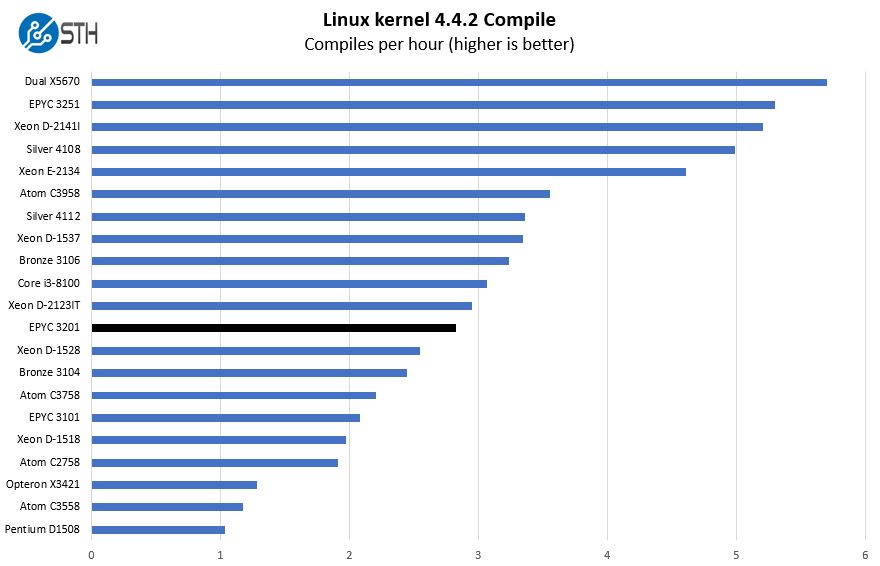
Even though it uses significantly less power, the AMD EPYC 3201 performs almost on par with the Intel Xeon D-2123IT and just above the 6 core, 12 thread Intel Xeon D-1528. That is an excellent result.
c-ray 1.1 Performance
We have been using c-ray for our performance testing for years now. It is a ray tracing benchmark that is extremely popular to show differences in processors under multi-threaded workloads. We are going to use our 4K results which work well at this end of the performance spectrum.
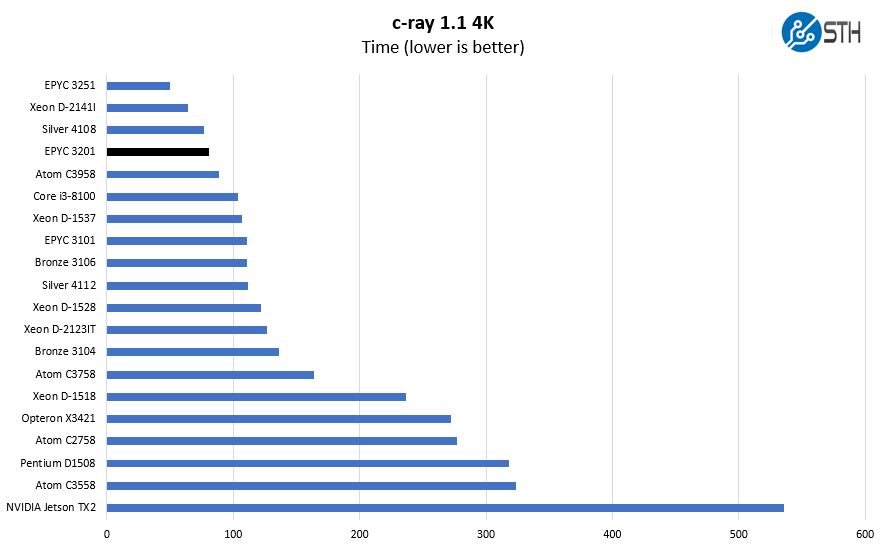
In c-ray, AMD “Zen” architecture performs very well. A slight victory here for the AMD EPYC 3201 over the sixteen core Intel Atom C3958. AMD has a product line that canvases the market between the Atom C3000, Xeon D-1500, and Xeon D-2100 lines which is very impressive.
7-zip Compression Performance
7-zip is a widely used compression/ decompression program that works cross-platform. We started using the program during our early days with Windows testing. It is now part of Linux-Bench.
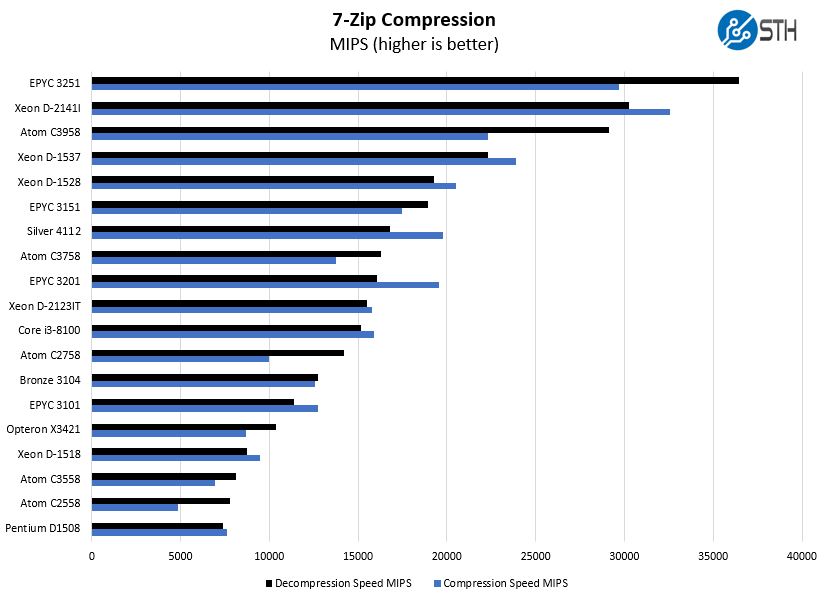
Here the AMD EPYC 3201 easily outpaces the AMD Opteron X3421. For those looking for more performance than the HPE ProLiant MicroServer Gen10 in a similar form factor, the Supermicro M11SDV-8CT-LN4F can fit that and offer more performance and expandability.
Sysbench CPU Test
Sysbench is another one of those widely used Linux benchmarks. We specifically are using the CPU test, not the OLTP test that we use for some storage testing.
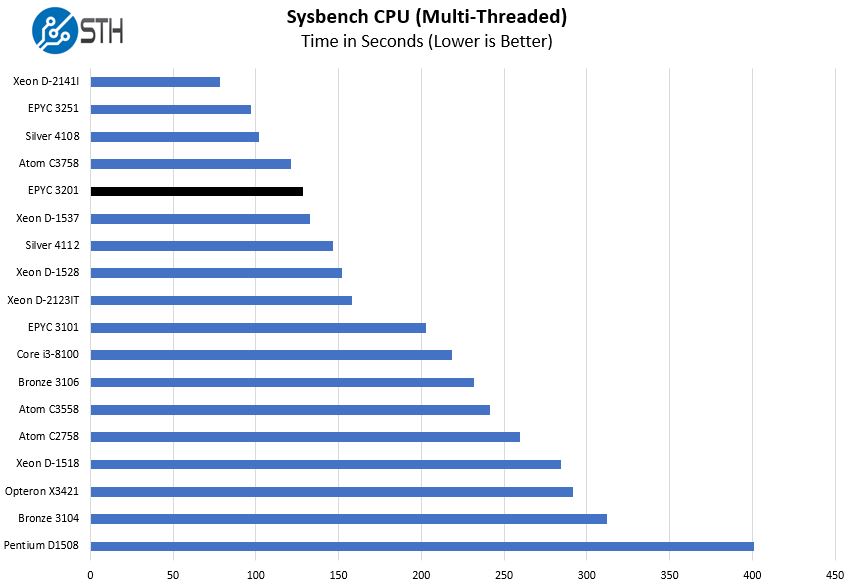
We wanted to point out that the AMD EPYC 3201 has a 30W TDP while the Supermicro M11SDV-8CT-LN4F and yet can outpace the Intel Xeon D-1537 8 core/ 16 thread part in some tests.
OpenSSL Performance
OpenSSL is widely used to secure communications between servers. This is an important protocol in many server stacks. We first look at our sign tests:
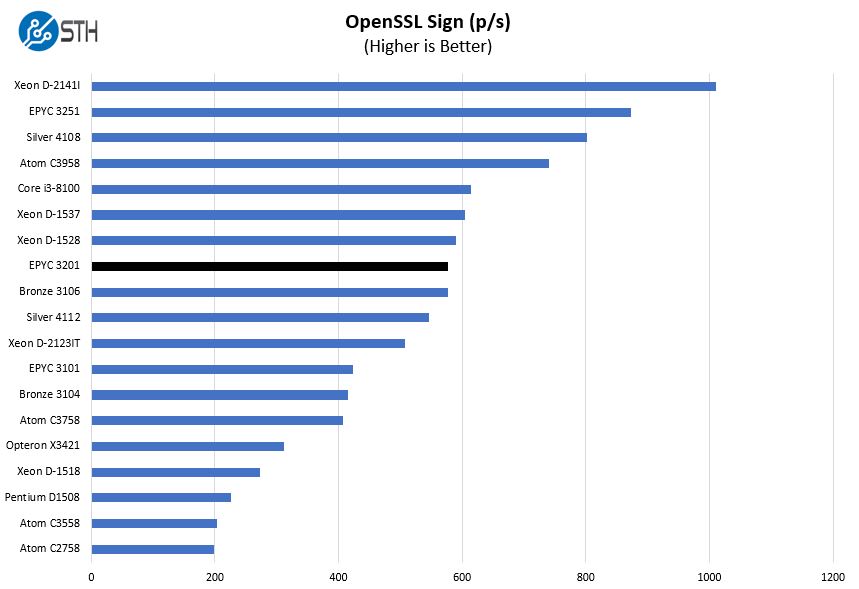
Here are the verify results:
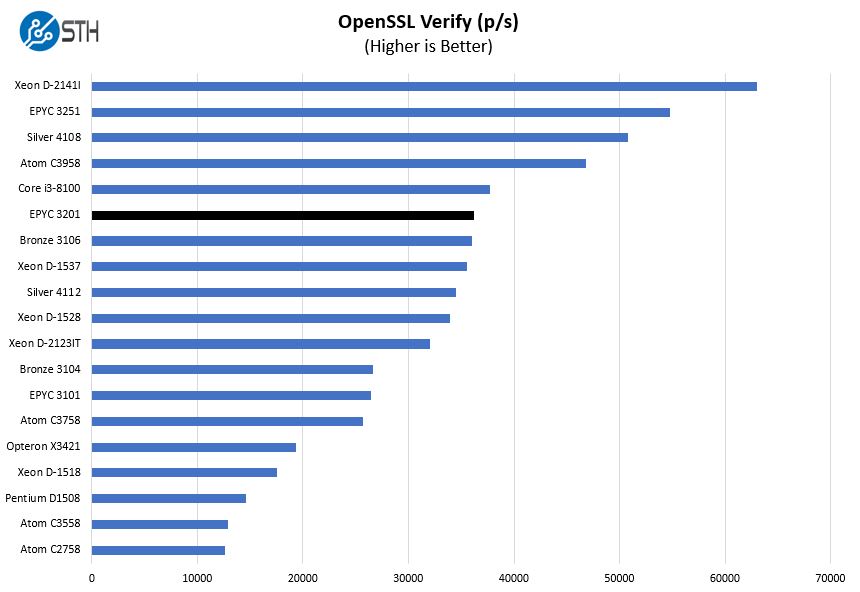
OpenSSL is a foundational web technology. Here we wanted to share an interesting data point that the Supermicro M11SDV-8CT-LN4F is faster than the Intel Xeon Bronze 3106 a much higher TDP part.
UnixBench Dhrystone 2 and Whetstone Benchmarks
Some of the longest-running tests at STH are the venerable UnixBench 5.1.3 Dhrystone 2 and Whetstone results. They are certainly aging, however, we constantly get requests for them, and many angry notes when we leave them out. UnixBench is widely used so we are including it in this data set. Here are the Dhrystone 2 results:
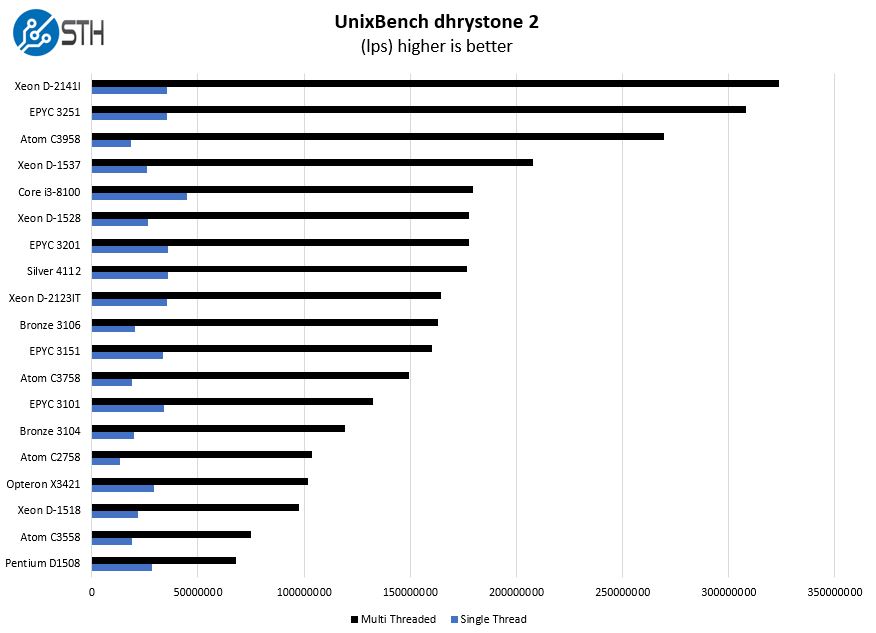
Here are the whetstone results:
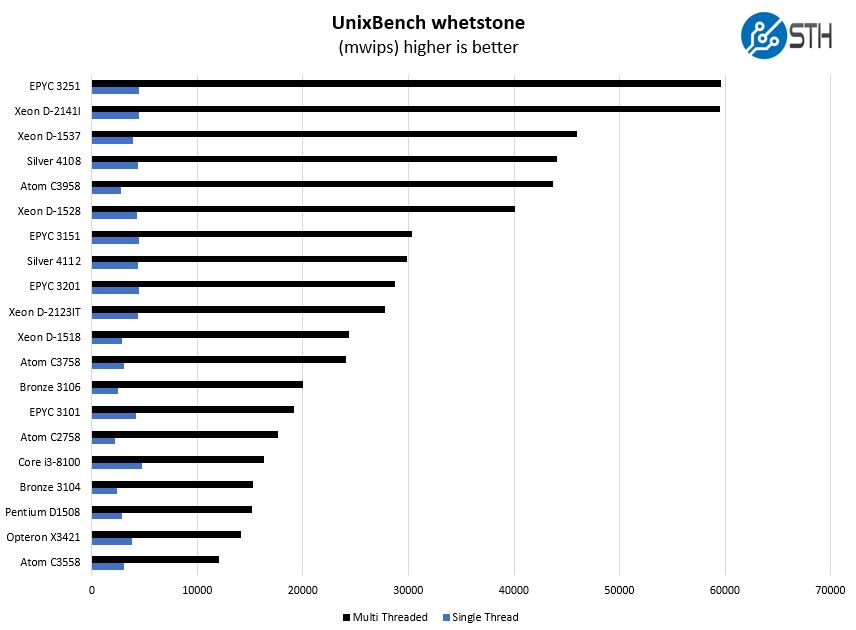
This is a good example of where higher TDP and higher clock speeds can help the AMD EPYC 3151. Here it performs faster than the EPYC 3201. Depending on your workload, we can see picking one over the other and Supermicro’s pricing has their respective M11SDV platforms priced relatively close.
Chess Benchmarking
Chess is an interesting use case since it has almost unlimited complexity. Over the years, we have received a number of requests to bring back chess benchmarking. We have been profiling systems and are ready to start sharing results:
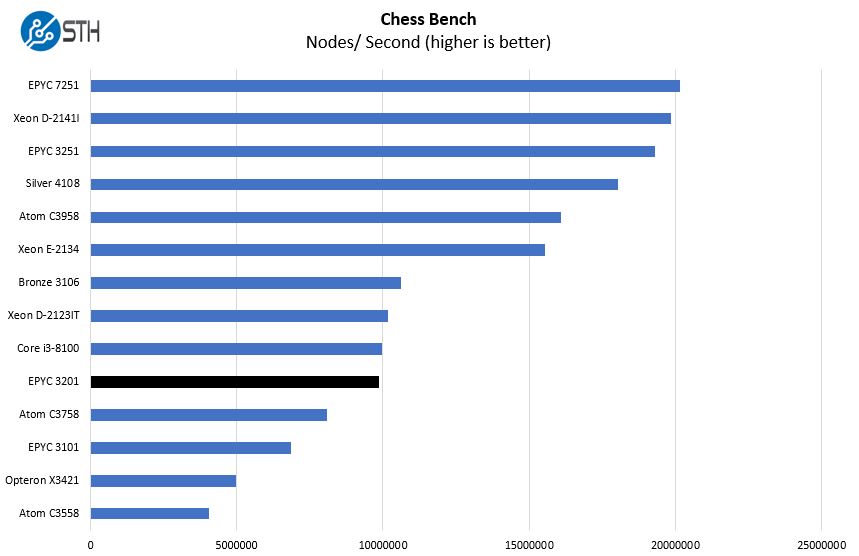
Here again, we see the AMD EPYC 3201 on the M11SDV-8CT-LN4F performs closer to higher-TDP Intel parts than we expected when it launched. The AMD Zen architecture has clear benefits that means one cannot directly compare an AMD core to an Intel core. The difference with this generation is that AMD parts often have better performance per watt.
Next, we are going to look at the Supermicro M11SDV-8CT-LN4F power consumption followed by our final words.


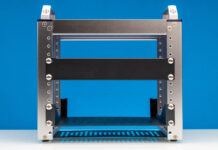

Hi Patrick, LOVE these reviews and glad to see a website focused to the whitebox datacenter/homelab folks.
I always wondered why you don’t run PassMark benchmarks? I know they aren’t the most representative of real-world perf, but the Single Thread Rating is, in my opinion the best way to compare IPC.
Sadly no 10GbE, seems a bit of a waste – non of the embedded EPYC solutions by Supermicro support this.
There is no excuse for not offering the 10G option, it’s mandatory for a server board these days. And for embedded use, it’s simply overkill in most cases. They completely missed the correct positioning, as usual. Nothing new, they completely killed Denverton by giving up the flexible IO and offering unreasonable options. It seems they cannot even design a compact chassis: what the hell is this CSE-E301 pie? What about designing a decent compact 1.5U or a 2U with 60mm/80mm fans and a PCI card slot at the top like on any server on earth? And maybe add an AC/DC board on the side? I’m not asking for something as fancy as a Mac Mini, but I mean… is it too difficult for you guys? What’s wrong with you? What’s wrong? I wish the were alternative brands.
Any opinions on getting this board vs waiting for Supermicro Xeon D-1600 options? Is the D-1612 likely to be performance competitive with this board, but with 10GbE?
I’m wondering as well. Also, when can we expect Intel Denverton successors? I’m in the market for a new home server / NAS but I’d like to buy future proofed HW.
Can anyone tell me if this board / cpu combo has h265 hardware acceleration?
It does not. There is no integrated GPU onboard.
What for RAID Controllers are Working ?
I am try to use 3Ware (LSI) 9690SA Series also 9590SE Series but no chance
Is the LSI SAS9207-8i working stable or any others ?